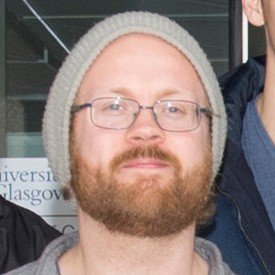
Dr Jan de Muijnck-Hughes
Lecturer
Computer and Information Sciences
Publications
- Towards being positively negative about dependent types
- de Muijnck-Hughes Jan
- 31st Conference on Types for Proofs and Programs (2025)
- Colouring flags with Dafny & Idris
- de Muijnck-Hughes Jan, Noble James
- Dafny 2024 (2024)
- Capable : a mechanised imperative language with native multiparty session types
- Muijnck-Hughes Jan de, Urlea Cristian, Voinea Laura, Vanderbauwhede Wim
- ACM SIGPLAN International Conference on Systems, Programming, Languages and Applications: Software for Humanity (2023)
- Wiring circuits is easy as 0, 1, omega, or is it... (Artifact)
- Muijnck-Hughes Jan de, Vanderbauwhede Wim
- , pp. 4:1-4:3 (2023)
- https://doi.org/10.4230/DARTS.9.2.4
- Wiring circuits is easy as {0,1,w}, or is it...
- de Muijnck-Hughes Jan, Vanderbauwhede Wim
- 37th European Conference on Object-Oriented Programming, ECOOP 2023 37th European Conference on Object-Oriented Programming, ECOOP 2023 Leibniz International Proceedings in Informatics, LIPIcs Vol 263 (2023)
- https://doi.org/10.4230/LIPIcs.ECOOP.2023.8
- Type theory as a language workbench
- de Muijnck-Hughes Jan, Allais Guillaume, Brady Edwin
- Eelco Visser Commemorative Symposium (EVCS 2023) Open Access Series in Informatics (OASIcs) Vol 109 (2023)
- https://doi.org/10.4230/OASIcs.EVCS.2023.9
Teaching
I teach on topics relating to functional programming, formal verification, and Cyber Security. Specifically, I teach on the following Masters level modules:
- CS813: Advanced Information Security
- CS886: Advanced Security-by-Design
I also supervise undergraduate and masters projects. Specifically, I supervise students taking:
- CS408 Individual Project (BSc (Hons) Final Year Dissertation)
- CS958 Individual Project (MSc Dissertation Project)
- CS811 Dissertation (MSc GA Cyber Dissertation Project)
Research Interests
Generally speaking, my research interests involve making Systems Engineering more TyDe: Type-Driven. I want to combine cutting-edge programming language theory (namely novel combinations of type systems, dependent types & functional programming) and fundamentally change the way we engineer systems by interlinking our System's specifications and implementations. I believe that if we are to ever build trustworthy systems, we must make machine checkable specifications an intrinsic aspect of the system through adoption of type-driven approaches.
Functional programming is a well studied domain for describing how we can structure our code and specifications. I have used functional programming as the foundation in which to specify novel encodings of hardware interface specifications and the languages themselves.
Type Systems enable us to describe what it means for a program and specification to be correct. I have used novel typing disciplines to encapsulate good structure of hardware designs and also the behaviour of programs.
I have also explored the use of behavioural types and resource-aware type systems to ensure that existing programs behave correctly by retrofitting their design with a new type system.
Dependent types are an expressive environment in which we can reason about, and realise, our software, leveraging the Curry-Howard correspondence that our programs are proofs when our types are propositions.
I have long used the Idris programming language to mechanise my results and explore how best to use dependent types to structure our programs. I have begun exploring how we can use dependent types to provide machine executable language specifications.
There are more topics (privacy and cryptography) that I am interested in, but the above keeps me busy for now!
Professional Activities
- Scottish Programming Languages Seminar Series: December 2025
- Organiser
- 3/12/2025
- CyBOK Showcase
- Participant
- 3/11/2025
- Bidirectional Typing & Session Types, A Beautiful Friendship?
- Speaker
- 22/10/2025
- 40th European Conference on Object-Oriented Programming (Event)
- Peer reviewer
- 8/10/2025
- Trends in Functional Programming (Event)
- Peer reviewer
- 19/9/2025
- Towards Being Positively Negative about Dependent Types
- Speaker
- 12/6/2025
Contact
Dr
Jan
de Muijnck-Hughes
Lecturer
Computer and Information Sciences
Email: jan.de-muijnck-hughes@strath.ac.uk
Tel: Unlisted
